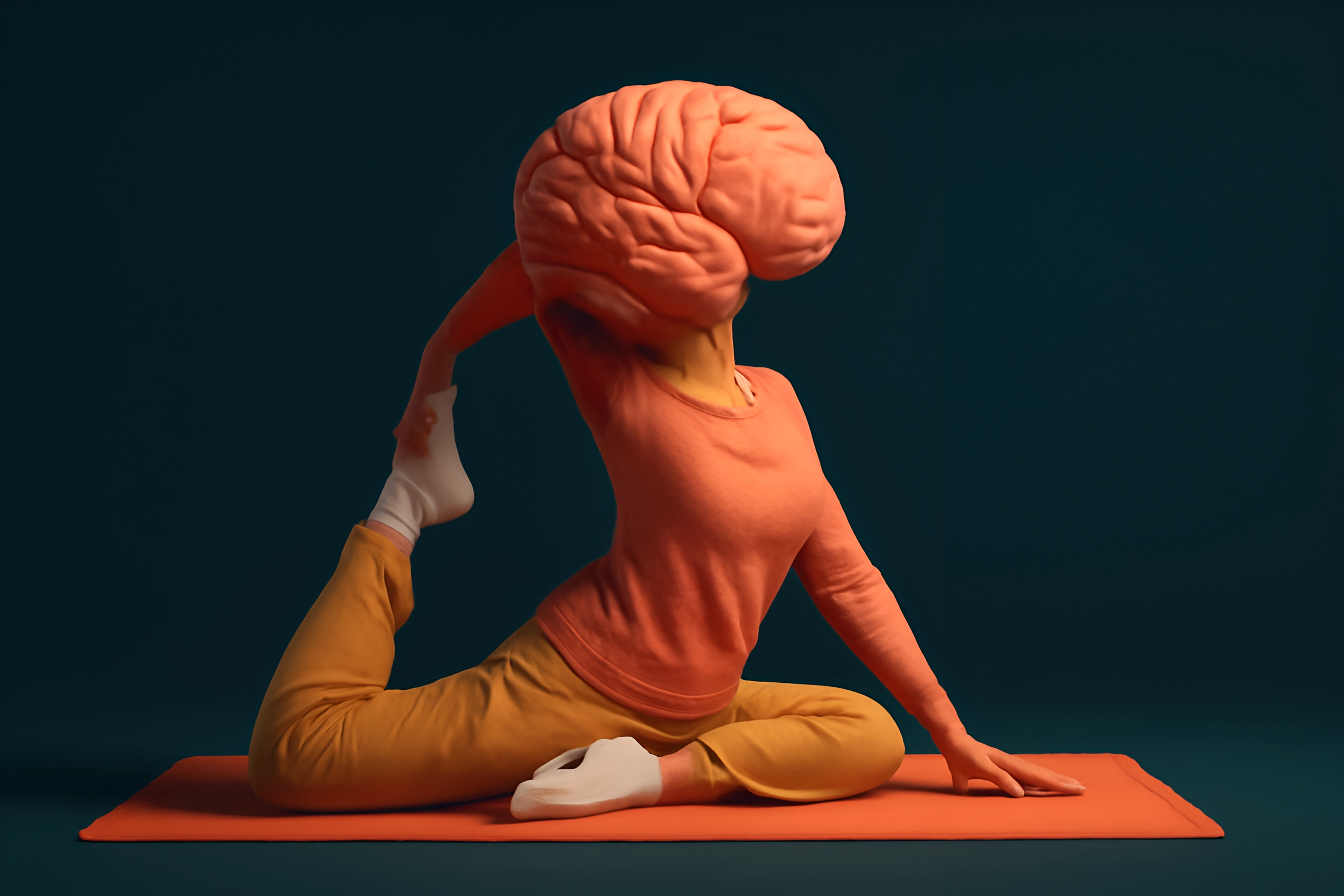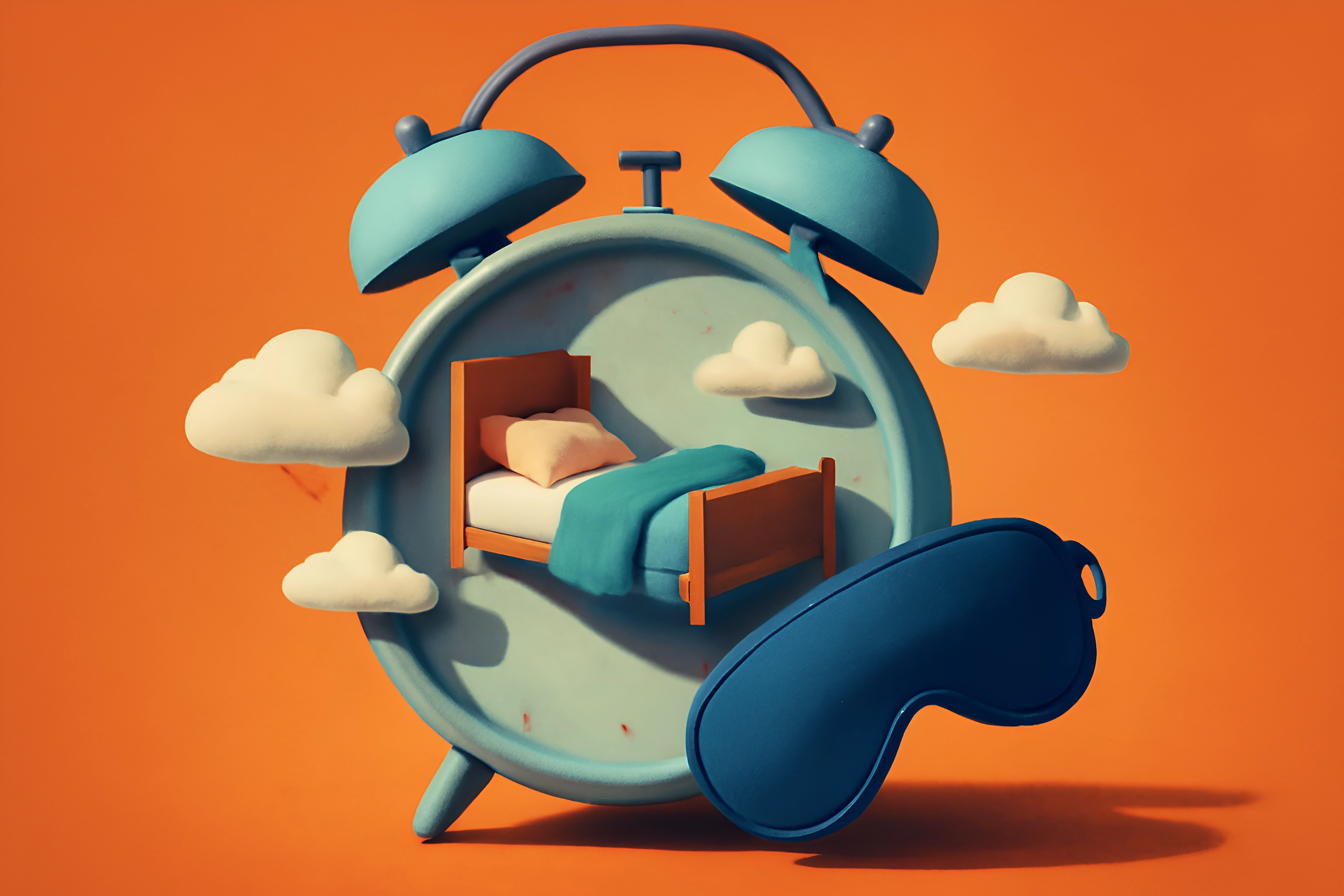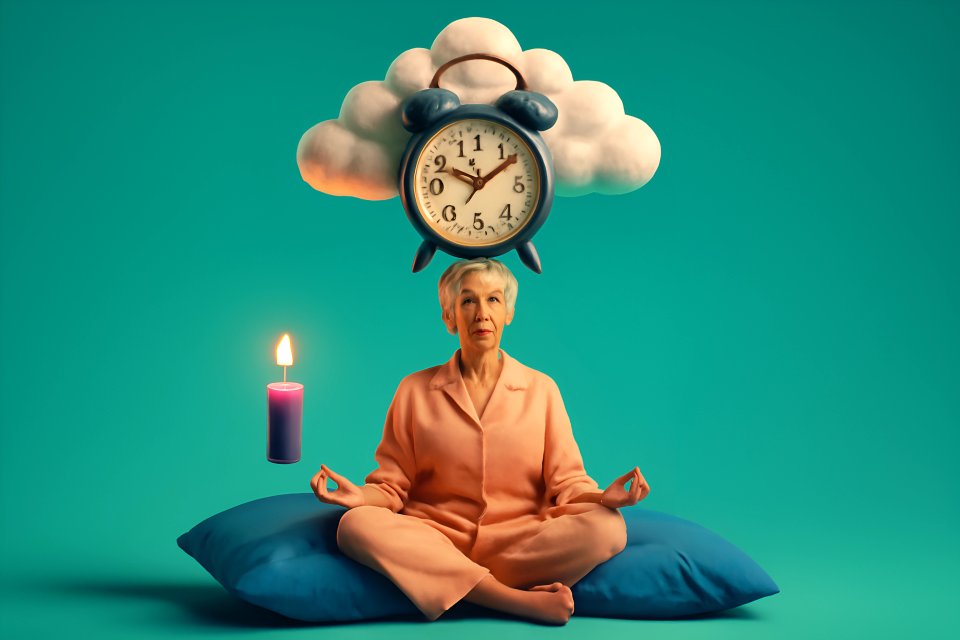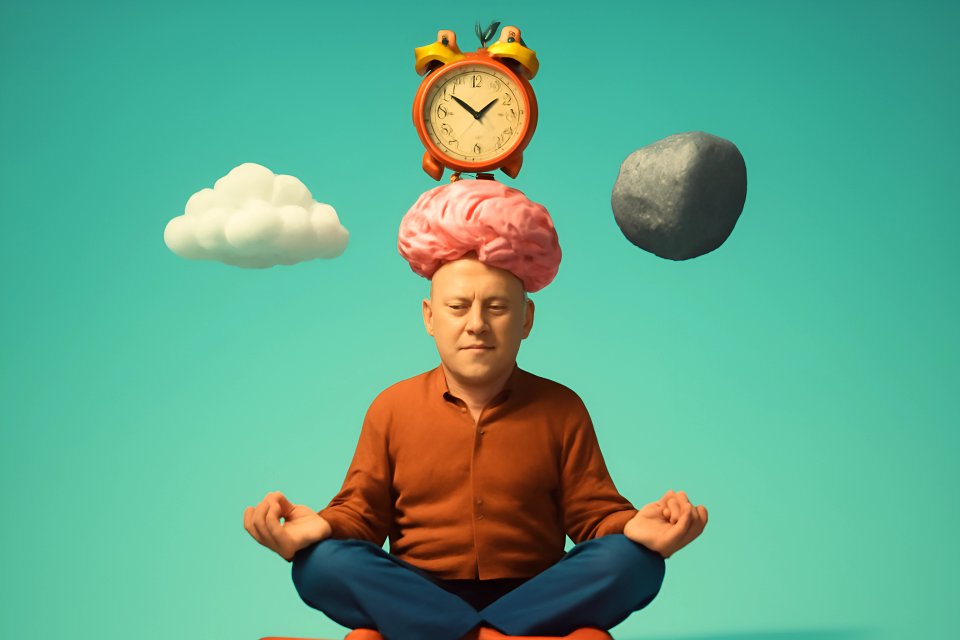
Is a good night's sleep feeling more like a distant memory than a nightly reality? If you're nodding along, you're certainly not alone. Turning 50 and beyond brings a wealth of wisdom and experience, but let's be honest, sometimes it also ushers in unwelcome changes to our sleep patterns. You might find yourself tossing and turning, waking up frequently, or feeling like you just can't get the deep, restorative rest you crave.
It's easy to dismiss these changes as just "part of getting older," but here at FitOverFifty, we believe that quality sleep isn't a luxury—it's a cornerstone of a vibrant and energetic life. Poor sleep doesn't have to be your new normal. Quality sleep is absolutely vital for maintaining your energy levels throughout the day, keeping your mood balanced, ensuring sharp cognitive function, and supporting your overall physical health, especially as your body navigates the incredible journey of aging.
This isn't about quick fixes or unproven gimmicks. We're here to empower you with actionable, realistic strategies specifically tailored for your over-50 body and lifestyle. Together, we'll explore how you can understand these changes and, more importantly, how you can reclaim those precious restful nights and wake up feeling refreshed, revitalized, and ready to embrace each day.
Why Sleep Can Change After 50: Understanding the Unique Challenges
Ever wonder why hitting the pillow doesn't guarantee a swift journey to dreamland like it used to? It's not just in your head; there are real, understandable reasons why sleep patterns can shift as we gracefully age. Understanding the "what" and "why" behind these changes is the first crucial step, empowering us to effectively address the "how" of improving our sleep.
Hormonal Shifts and Their Nightly Impact
One of the primary drivers of sleep changes, particularly for women, is the significant hormonal rollercoaster of menopause. Those infamous hot flashes and night sweats can turn a peaceful slumber into a sweaty, interrupted ordeal. But men aren't entirely off the hook; andropause, characterized by a gradual decline in testosterone, can also subtly affect sleep architecture, sometimes leading to more frequent awakenings or less restful sleep. These hormonal ebbs and flows directly influence the body's internal thermostat and sleep-regulating mechanisms.
Physiological Transformations with Age
Our internal body clock, or circadian rhythm, can also undergo a bit of a reset. Many older adults experience what's known as an advanced sleep phase, meaning they naturally feel tired earlier in the evening and wake up earlier in the morning. Furthermore, the prevalence of certain health conditions tends to increase with age, and these can be major sleep thieves. Arthritis pain can make finding a comfortable position a nightly struggle, conditions like sleep apnea can cause repeated breathing interruptions, Restless Legs Syndrome (RLS) brings an irresistible urge to move the legs, and nocturia, or frequent urination, can lead to multiple trips to the bathroom, fragmenting precious sleep. In fact, nearly 30% of adults over 65 experience nocturia, significantly disrupting sleep patterns.
Lifestyle Factors and Medications
Beyond internal changes, our daily lives and the medications we might take can also play a significant role. Some common medications prescribed for age-related conditions can have side effects that interfere with sleep quality. Changes in daily routines, perhaps due to retirement or a shift in activity levels, can also throw our sleep-wake cycle out of sync. And let's not forget the impact of stress and anxiety; life changes, worries about health, or family concerns can keep the mind racing when it should be winding down, making it harder to fall asleep and stay asleep.
Creating Your Optimal Sleep Sanctuary: Environment Tweaks for Better Sleep
Think of your bedroom: is it a true haven for rest, or has it become a multi-purpose room filled with distractions? Your sleep environment plays a monumental role in signaling to your brain that it's time to power down. By making a few strategic tweaks, you can transform your bedroom into the ultimate sleep sanctuary, perfectly optimized for achieving deep, restorative slumber.
Embrace the Darkness
Darkness is a crucial cue for your body to produce melatonin, the hormone that regulates sleep. Even small amounts of light can interfere with this process. Invest in good quality blackout curtains or blinds to block out streetlights or early morning sun. If complete darkness is hard to achieve, a comfortable sleep mask can be an excellent, inexpensive solution to shield your eyes and promote uninterrupted rest.
Cultivate Quietude
Noise is another common sleep disruptor, whether it's traffic sounds, a snoring partner, or household creaks. Aim to minimize noise disruptions as much as possible. Simple solutions like earplugs can be surprisingly effective. For more persistent or unavoidable noises, consider a white noise machine; some studies suggest that devices like the SNOOZ can improve sleep efficiency by masking disruptive sounds. In some cases, investing a little in soundproofing measures for your bedroom might be worthwhile for long-term peace.
Keep It Cool
Have you ever struggled to sleep because you felt too warm? There's a scientific reason for that. Your body temperature naturally dips as you prepare for sleep, and a cool room facilitates this process. Research indicates that the optimal sleep temperature for seniors is between 68–77°F (20–25°C). Use breathable bedding made from natural fibers like cotton or linen, consider a fan for air circulation, and choose sleepwear that helps manage body temperature, especially if you experience hot flashes.
Prioritize Comfort, Especially for Aches and Pains
As we age, aches and pains can become more pronounced, making comfort in bed paramount. Your mattress should be supportive, especially for aging joints; a medium-firm mattress often strikes the right balance, but personal preference is key. Don't underestimate the power of the right pillow! Ensure your pillow provides proper neck and spinal alignment. If you're a side sleeper, a pillow between your knees can alleviate hip and lower back strain.
Banish Clutter and Screens
Your bedroom should be reserved for two things: sleep and intimacy. Remove TVs, computers, work materials, and any other clutter that might create a stimulating or stressful environment. The blue light emitted from screens is particularly detrimental to sleep, so make a firm rule: no screens in the bedroom. This mental association—bedroom equals rest—is incredibly powerful.
Crafting a Restful Bedtime Routine: Winding Down for Success
Just as an athlete prepares for a competition, you need to prepare your body and mind for a night of restful sleep. Consistency is your greatest ally in this quest. Establishing a soothing and predictable bedtime routine signals to your brain that it's time to transition from the hustle and bustle of the day to a state of calm and relaxation, paving the way for a smoother descent into sleep.
The Unwavering Power of a Consistent Sleep Schedule
One of the most effective strategies for improving sleep is to go to bed and wake up around the same time every day, yes, even on weekends! This regularity helps to regulate your body's internal clock, or circadian rhythm, making it easier to fall asleep and wake up naturally. While it might be tempting to sleep in on Saturdays, it can throw your rhythm off for the days to come. Aim for consistency, and your body will thank you with more predictable sleep patterns.
Your Pre-Sleep Wind-Down Ritual (1-2 Hours Before Bed)
Think of the hour or two before bed as your sacred wind-down time. This is when you consciously shift gears.
- Dim the Lights and Limit Screen Time: Bright lights, especially the blue light from phones, tablets, and computers, can significantly delay melatonin onset, tricking your brain into thinking it's still daytime. Power down your devices at least an hour, preferably 90 minutes, before bed. Instead, opt for activities that soothe the mind.
- Engage in Gentle, Calming Activities: Read a physical book under soft lighting (not an e-reader if it's backlit). Listen to calming music or a relaxing podcast. Gentle stretching or some light yoga poses can also help release tension from your body.
- Indulge in a Warm Bath or Shower: A warm bath or shower about 90 minutes before bed can work wonders. The initial rise in body temperature followed by a gradual cool-down mimics the natural temperature drop that precedes sleep, and studies show a warm bath can accelerate sleep onset. Add some Epsom salts to the water to help relax tired muscles.
- Practice Mindfulness and Relaxation Techniques: Dedicate a few minutes to deep breathing exercises, meditation, or journaling. Writing down any worries or to-do list items for the next day can help clear your mind, preventing those thoughts from keeping you awake. There are many simple apps and guided meditations available if you're new to these practices.
Be Mindful of Evening Food and Drink
What you consume in the hours leading up to bedtime can have a significant impact on your sleep quality. Avoid heavy meals or spicy foods close to bedtime, as they can cause indigestion or heartburn. Caffeine and alcohol are notorious sleep disruptors; limit caffeine intake, especially after lunchtime, as its effects can linger for hours. While alcohol might initially make you feel drowsy, it often leads to fragmented sleep later in the night. Stay hydrated during the day, but try to taper off your fluid intake in the evening to minimize nighttime trips to the bathroom.
Daytime Habits That Impact Nighttime Sleep
Believe it or not, your quest for better sleep doesn't just begin when the sun goes down. What you do during the day significantly sets the stage for your night. By cultivating healthy daytime habits, you're actively programming your body for more restful and rejuvenating nights. It's about creating a holistic rhythm that supports your natural sleep-wake cycle.
Soak Up the Sunlight
Natural sunlight is a powerhouse when it comes to regulating your circadian rhythm. Exposure to daylight, especially in the morning, helps to reinforce your body's natural wakefulness signals and, in turn, promotes better melatonin production in the evening. Aim to get at least 30 minutes of natural light each day. A brisk morning walk, enjoying your coffee on the patio, or simply sitting by a sunny window can make a noticeable difference.
Embrace Regular Physical Activity
This is a core principle at FitOverFifty, and for good reason! Regular physical activity is fantastic for your overall health, and it's a champion for better sleep. Exercise can help reduce stress, improve mood, and regulate your body's energy expenditure, all of which contribute to more sound sleep. Focus on age-appropriate activities you enjoy, such as walking, swimming, cycling, or strength training. For detailed ideas, you might want to explore how to build a low-impact exercise routine over 50. Just be mindful of timing; while regular exercise is beneficial, try to avoid intense workouts too close to bedtime, as they can be overly stimulating for some. Research shows that moderate aerobic exercise can significantly increase deep sleep in older adults.
Nap Strategically, If Necessary
If you find yourself needing a nap, there's a right way to do it. Keep naps short, ideally around 20-30 minutes, as this can provide a refreshing boost without interfering with nighttime sleep. It's also best to avoid napping late in the afternoon, as this can decrease your sleep drive come bedtime. Be aware that while short naps can be beneficial, frequent or long daytime napping in seniors has been linked to other health concerns, so it's about finding a balance that works for you.
Actively Manage Stress and Anxiety
Unmanaged stress and anxiety are notorious sleep thieves. If your mind is racing with worries from the day, it's incredibly difficult to drift off to sleep. Incorporate stress-reduction techniques into your daily routine, not just at bedtime. This could include mindfulness practices, spending time in nature, engaging in hobbies you love, or connecting with supportive friends and family. Learning to manage stress during your waking hours will make it much easier to find peace at night.
Natural Approaches & Considerations for Over 50s
While lifestyle adjustments are foundational, sometimes exploring gentle, natural aids can provide additional support on your journey to better sleep. It's always about proceeding with awareness and, crucially, consulting your healthcare provider, especially if you have existing health conditions or are taking medications, as even natural remedies can have interactions.
Soothing Herbal Teas
A warm, comforting cup of herbal tea can be a lovely part of a wind-down ritual. Certain herbs have long been associated with relaxation and sleep. Chamomile tea is well-known for its calming properties. Valerian root is another popular choice, with some studies suggesting valerian can reduce the time it takes to fall asleep. Passionflower tea is also often used for its gentle sedative effects. Remember to check for any potential interactions with medications you might be taking before incorporating new herbal remedies.
The Power of Magnesium
Magnesium is an essential mineral that plays a crucial role in hundreds of bodily functions, including muscle relaxation and nerve function, both of which are important for sleep. Some research indicates that magnesium supplements, particularly magnesium glycinate, may improve sleep efficiency. You can also increase your magnesium intake through foods like leafy green vegetables, nuts, seeds, and whole grains. However, if you're considering a supplement, it's vital to discuss it with your doctor first, as magnesium can interact with certain medications and isn't suitable for everyone.
Melatonin: Use with Understanding and Caution
Melatonin is a hormone your body naturally produces to regulate the sleep-wake cycle. As we age, natural melatonin production can decline. While melatonin supplements are widely available and can be helpful for certain sleep issues like jet lag or shift work, they are not a universal solution for insomnia, especially in older adults. Older individuals may be more sensitive to melatonin, and it can sometimes cause daytime drowsiness or other side effects. It's strongly advised to consult your doctor to determine if melatonin is appropriate for you, and if so, the correct dosage, particularly if you have existing health conditions or are on other medications.
Calming Aromatherapy
The sense of smell can have a powerful effect on our mood and state of relaxation. Aromatherapy involves using essential oils from plants to promote well-being. Lavender is perhaps the most well-known essential oil for sleep, with some studies suggesting that diffusing lavender oil can increase deep sleep, particularly in postmenopausal women. Bergamot and chamomile are other scents often used for their calming properties. You can use essential oils in a diffuser, add a few drops to a warm bath, or use a pillow spray, ensuring they are properly diluted and used safely.
When to Consult Your Doctor
While the strategies we've discussed can make a significant difference for many, it's important to recognize when self-help measures aren't enough and professional guidance is needed. Your doctor is your partner in health, and they can help identify any underlying issues that might be sabotaging your sleep. Don't hesitate to reach out; you deserve to feel your best.
It's time to schedule a conversation with your healthcare provider if you experience persistent insomnia—meaning trouble falling asleep, staying asleep, or waking up too early—despite consistently trying these self-help strategies for several weeks. If you or your partner suspect you might have a sleep disorder, such as loud, disruptive snoring, gasping for air during sleep (which could indicate sleep apnea), or an uncontrollable urge to move your legs at night (suggestive of Restless Legs Syndrome), a medical evaluation is crucial. Undiagnosed conditions like sleep apnea can have serious health consequences, including an increased risk of dementia.
Furthermore, if your sleep problems are significantly impacting your daily life, affecting your mood, concentration, energy levels, or overall health, it's a clear sign to seek professional advice. And, as a golden rule, always consult your doctor before starting any new supplements, including melatonin or herbal remedies, especially if you are currently taking other medications or have pre-existing health conditions, to avoid potential interactions or adverse effects. At FitOverFifty, we empower you to be proactive about your health; seeking help when you need it is a sign of strength and a vital step towards well-being.
Conclusion: Embracing Restful Nights for a Vibrant Life Over 50
Reclaiming your sleep and improving its quality after 50 is not just a dream; it's an achievable reality with consistent effort and strategies tailored to your unique needs. As we've explored, understanding the changes your body is going through, optimizing your sleep environment, crafting soothing routines, and adopting healthy daytime habits can collectively pave the way for more restful nights. Remember, even small, incremental changes can lead to significant improvements in how you feel each day.
At FitOverFifty, our philosophy centers on empowering you with practical, sustainable habits for long-term well-being and vitality. Better sleep is a cornerstone of that vitality, fueling your energy, sharpening your mind, and uplifting your spirits. It's about nurturing your body and mind so you can live your life over 50 to the absolute fullest, with the zest and vigor you deserve.
Now, we'd love to hear from you! What's one strategy from this guide that you're inspired to try this week to improve your sleep? Share your thoughts, experiences, or your own favorite sleep tips in the comments below!
















